While the MSP Asian Film Festival runs during the next 10 days at St. Anthony Main, the Walker is delivering a series of films that are distinctive if only because an MSP African Film Festival is probably still a long, long way off.
Co-presented by the University of Minnesota's Office of International Program, the Walker presents "Ousmane Sembene: African Stories", a retrospective of nine feature films from the Senegalese artist The New Yorker called "one of the world's greatest political filmmakers".
I've only seen Moolaadé (2004), Sembene's award-winning critical portrait of female genital mutilation (read a great review by a blogging pal), but it left an impression on me, to say the least. Here is the official description of the series, followed by the full schedule and selected trailers:
"Africa, a continent full of stories both old and new, has over the last half century been affected by enormous political, social, and ecological change. Since shedding its long period of colonialism, it has seen newly formed governments, revived countries, and tribal alliances placed under severe pressure by conflicts over resources, foreign intervention, social customs, and religious differences. Perhaps no filmmaker captured these transformations better than Ousmane Sembene, the Senegalese artist who turned his own literature into film and became known as the father of African cinema. His career began in the years directly following Senegal’s independence and continued until 2006. The Walker is pleased to show all nine of his feature films, which range from portraits of immigrants to satires to period films based on events ignored or repressed by non-Africans.
Building on a history of partnerships between their two institutions, Walker Art Center film curator Sheryl Mousley and University of Minnesota associate professor Charles Sugnet, who specializes in fiction and film of the African diaspora with a focus on the work of Sembene, have produced this timely retrospective. Each screening is followed by a conversation hosted by local and international scholars focusing on the history of African film and contemporary issues in Senegal. Additionally, a course is being offered through the University of Minnesota entitled Film and Fiction of Ousmane Sembene.
The Ousmane Sembene program is co-presented by Global Spotlight, the University of Minnesota Office of International Programs’ biennial focus on a region of the world and a pressing global issue. In 2009-2010, the focus is on the continent of Africa and the issue of Water in the World."
Schedule (showtimes and tickets):
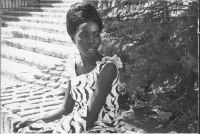 | Black Girl (La noire de...) November 5 A Senegalese maid employed in the Cote d'Azur is confined to the kitchen and treated like an object--forced to defend her humanity against a new form of slavery. | |
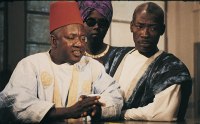 | Mandabi (The Money Order) - November 6 An unexpected money order appears to be a boon to Ibrahima Dieng and his large family--but Dieng's attempts to cash it make for a ruefully comic tour of the bureaucracy in a newly independent Senegal. |
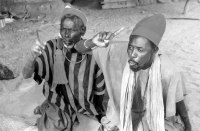 | Guelwaar November 7 A missing body delays a Christian funeral--and launches a satire involving religious conflict and still-controversial objections to dependency on foreign aid. When powerful elites fail, Sembene finds genuine leaders in surprising places: a parish priest, a local cop, and a village imam. |
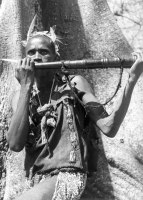 | Emitai (God of Thunder) November 12 In 1942, Vichy French soldiers stationed in Dakar arrive in southern Senegal to confiscate rice from the fiercely independent Joola people, but the women have hidden the crop. Based on historical events, including a massacre and the deportation of Queen Aline Sitoé Diatta (the "Joan of Arc of Senegal"), this is the only full-length feature in the Joola language. |
 | Xala (Temporary Impotence) - November 13 Sembene's comic portrait of the new Dakar bourgeoisie was chosen as one of the British Film Institute's 100 best films. This brilliantly funny, ironic satire goes sour when it is revealed that businessman El Hadji Abdou Kader Beye got his start by swindling his own family. |
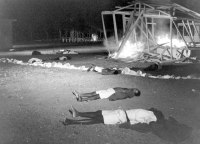 | Camp de Thiaroye - November 14 African troops were essential to Charles de Gaulle's Free French forces, which helped to liberate France after its surrender to Hitler. But upon victory, de Gaulle wanted to see only white faces marching toward the Arc de Triomphe--African soldiers were rapidly demobilized, and some were detained in a concentration camp-like facility at Thiaroye. |
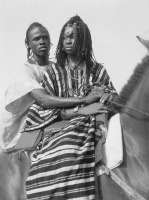 | Ceddo November 17 Slave traders, Christian missionaries, and proselytizing Muslims come together at a mythical, unspecified moment of West African history, as a Wolof princess resists a powerful imam who forcibly converts an entire village. |
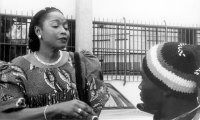 | Faat Kiné November 19 A successful Dakar businesswoman and middle-aged single mother, Faat Kine still hopes to find love, despite terrible treatment by men in her life. |
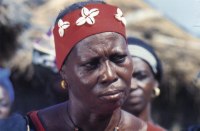 | Moolaade - November 20 Fatoumata Coulibaly plays Collé, a courageous mother in a small Burkina Faso village who refused "circumcision" (genital cutting) for her daughter, and subsequently is asked for help by girls who want to be spared. When Collé sets up a magical line of protection for the girls at her home, the village descends into chaos. |


I managed a retrospective on his films two years ago at the Film Forum. Eight features were shown including MOOLAADE, XALA and one I hadn't seen to that point: CAMP DE THYAROYE (which was masterful)
ReplyDeleteHe is a the greatest African director of all-time.
Hard to argue against that, Sam (if only because he is one of the few well-known African directors); thanks for providing Joel with that forum for the Moolade review at WitD.
ReplyDelete